Will Afghanistan descend into civil war? The resistance has begun
Fighters and politicians in Panjshir valley vow to fight Taliban but will they settle for seat at the table?
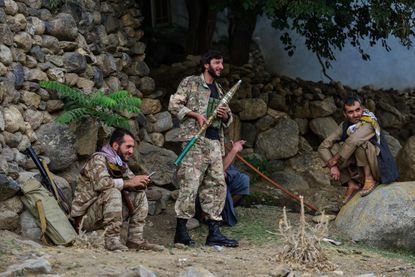
The Taliban has taken control of Afghanistan 20 years after it was ousted by US coalition forces, but reports of simmering resistance in the north-east have led to predictions that the war-torn country is once again heading for civil conflict.
The Guardian said that within hours of the Taliban taking Kabul virtually unopposed on Sunday, fighters and politicians had “vowed” that the struggle was not over, promising to “fight back from the last corner of the country not under control of the militant group”.
Tobias Ellwood, the Conservative chair of the Defence Select Committee, told Radio 4’s World at One yesterday: “Us pulling out will lead to a terrible civil war because there is nothing simple about this transition. The Northern Alliance as it was, the Uzbeks and Tajiks and warlords, are now regrouping and they will come back with vengence and it will lead to another very dark chapter for Afghanistan.”
Subscribe to The Week
Escape your echo chamber. Get the facts behind the news, plus analysis from multiple perspectives.

Sign up for The Week's Free Newsletters
From our morning news briefing to a weekly Good News Newsletter, get the best of The Week delivered directly to your inbox.
From our morning news briefing to a weekly Good News Newsletter, get the best of The Week delivered directly to your inbox.
In a piece for The Washington Post, one of those fighters, Ahmad Massoud, leader of the National Resistance Front of Afghanistan, said mujahideen fighters are “prepared to once again take on the Taliban”.
Writing from the Panjshir valley, a resistance stronghold north of Kabul, he said he and his fellow fighters have “stores of ammunition and arms” because “we knew this day might come”.
The son of an assassinated mujahideen commander, Massoud said he has been joined by soldiers from the Afghan regular army who were “disgusted by the surrender of their commanders”, and that former members of the Afghan Special Forces “have also joined our struggle”.
He said the fighters “will defend Panjshir as the last bastion of Afghan freedom” but called for help from the West, because “we need more weapons, more ammunition and more supplies”. Massoud said the rebels’ “military forces and logistics” will be “rapidly depleted unless our friends in the West can find a way to supply us without delay”.
Panjshir valley was a centre of resistance against the Soviets in the 1980s and the Taliban in the 1990s. The former vice-president of Afghanistan, Amrullah Saleh, who has declared himself caretaker president, said the area will now reprise that role as a new resistance builds. Videos on social media showed other opposition figures in the area, including General Bismillah Mohammadi, who until Sunday had been the country’s defence minister.
However, The Guardian said some who have “holed up there [in Panjshir] and vowed to fight” may be “bidding for a stake in the new government”.
Their aspiration could be realised as Taliban officials have already hinted that they plan to include former opponents in running the country, and they have left some officials of the former government in place. Some analysts have predicted that the Taliban could even form a coalition government that would represent all Afghan factions.
Then there are geographical and economic challenges. The Guardian pointed out that Panjshir’s fortress-like defences would make supplying an insurgency a “challenge” and speculated that Saleh and his allies would probably struggle to find significant foreign backing.
However, the nation remains tense, said The New York Times. Taliban fighters have used gunfire to disperse demonstrations in the northeastern city of Jalalabad and Khost in the southeast, with some of the protesters raising the Afghan government flags that the Taliban had taken down just days earlier.
Tensions could escalate in the near future, according to a UN document seen by the paper. It said that the Taliban appear to be stepping up efforts to arrest people who worked in the former government, particularly in the security services, and those who aided them. The militants may even seize family members.
Afghanistan’s ambassador to Tajikistan, Lt Gen Zahir Aghbar, warned the Taliban that they might not prevail in a fight. “Panjshir stands strong against anyone who wants to enslave people,” he said. “I cannot say that the Taliban have won the war.”
Create an account with the same email registered to your subscription to unlock access.
Sign up for Today's Best Articles in your inbox
A free daily email with the biggest news stories of the day – and the best features from TheWeek.com
Chas Newkey-Burden has been part of The Week Digital team for more than a decade and a journalist for 25 years, starting out on the irreverent football weekly 90 Minutes, before moving to lifestyle magazines Loaded and Attitude. He was a columnist for The Big Issue and landed a world exclusive with David Beckham that became the weekly magazine’s bestselling issue. He now writes regularly for The Guardian, The Telegraph, The Independent, Metro, FourFourTwo and the i new site. He is also the author of a number of non-fiction books.
-
 'A speaker courageous enough to stand up to the extremists in his own party'
'A speaker courageous enough to stand up to the extremists in his own party'Instant Opinion Opinion, comment and editorials of the day
By Harold Maass, The Week US Published
-
 How could the Supreme Court's Fischer v. US case impact the other Jan 6. trials including Trump's?
How could the Supreme Court's Fischer v. US case impact the other Jan 6. trials including Trump's?Today's Big Question A former Pennsylvania cop might hold the key to a major upheaval in how the courts treat the Capitol riot — and its alleged instigator
By Rafi Schwartz, The Week US Published
-
 Today's political cartoons - April 18, 2024
Today's political cartoons - April 18, 2024Cartoons Thursday's cartoons - impeachment Peanuts, record-breaking temperatures, and more
By The Week US Published
-
 How would we know if World War Three had started?
How would we know if World War Three had started?Today's Big Question With conflicts in Ukraine, Middle East, Africa and Asia-Pacific, the 'spark' that could ignite all-out war 'already exists'
By Harriet Marsden, The Week UK Published
-
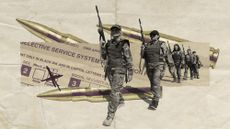 The issue of women and conscription
The issue of women and conscriptionUnder the radar Ukraine military adviser hints at widening draft to women, as other countries weigh defence options amid global insecurity
By Harriet Marsden, The Week UK Published
-
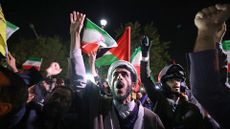 Will Iran's attack on Israel backfire?
Will Iran's attack on Israel backfire?Today's Big Question The unprecedented targeting of Israel could be a 'godsend' for Netanyahu as the limits of Tehran's military power are exposed
By Elliott Goat, The Week UK Published
-
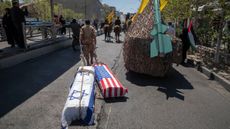 Will Iran risk all-out war with Israel?
Will Iran risk all-out war with Israel?Today's Big Question Tehran has not wanted to be directly involved in the Middle East conflict so far. But that could be about to change
By Chas Newkey-Burden, The Week UK Published
-
 Why is Islamic State targeting Russia?
Why is Islamic State targeting Russia?Today's Big Question Islamist terror group's attack on 'soft target' in Moscow was driven in part by 'opportunity and personnel'
By Elliott Goat, The Week UK Published
-
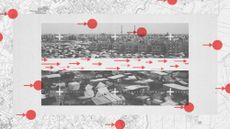 'Humanitarian islands': how will Israel's plan for Rafah civilians work?
'Humanitarian islands': how will Israel's plan for Rafah civilians work?Today's Big Question Designated zones in central Gaza to provide temporary housing, food and water for more than a million displaced Palestinians
By The Week UK Published
-
 Ukraine's unconventional approach to reconstruction
Ukraine's unconventional approach to reconstructionUnder the radar Digitally savvy nation uses popular app to file compensation claims, access funds and rebuild destroyed homes
By Harriet Marsden, The Week UK Published
-
 What does victory now look like for Ukraine?
What does victory now look like for Ukraine?Today's Big Question Not losing is as important as winning as the tide turns in Russia's favour again
By Elliott Goat, The Week UK Published